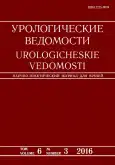Vol 6, No 3 (2016)
- Year: 2016
- Articles: 5
- URL: https://bakhtiniada.ru/uroved/issue/view/340
- DOI: https://doi.org/10.17816/uroved63
Articles
 5-10
5-10


Disorders of bladder microcirculation and morphologic changes in women with leukoplakia of the bladder
Abstract
This study consists of 145 women with morphologically confirmed diagnosis of leukoplakia of the bladder. Patients were divided into 3 groups. Group n. 1 consisted of 32 (22.1%) women who morphologically had the simple form of leukoplakia. Group n. 2 consisted of 71 (48.9%) women with verrucous leukoplakia and the third group consisted of 42 (29%) patients with keratinization type of leukoplakia.The control group consisted of 32 healthy women. Blood flow in the bladder was evaluated by intravesical high frequency Doppler ultrasound. The relationship between the character of morphological changes in the severity of leukoplakia and microcirculation disorders in the bladder was detected. The most severe microcirculatory disorders observed in patients treated with a special morphological type of leukoplakia – keratinization leukoplakia.
 11-18
11-18


Selective serotonin reuptake inhibitor and fertility potential of the men. Psychiatry and Urology. At the junction of related disciplines
Abstract
Introduction. Iinfertility leads to emotional stress, which is a precipitating factor of depression. Stress has also been recognized as one of possible reasons of pathospermia and infertility. The aim of pilot study: to evaluate SSRIs effects on spermatogenesis and fertility in the treatment of depression.
Material and Methods. Study included 19 fertile men with depression of mild severity. None of them had any urological disorders. They were treated by fluoxetine 20 mg per day during 6 weeks. Semen analysis (WHO 5), level of DNA fragmentation were performed before, after the therapy and 3 months of drug discontinuation.
Results. All the men had normal semen parameters and level of DNA fragmentation before the treatment. After 6 weeks of the treatment, we fixed the reduction of sperm´s parameters and increasing the level of DNA fragmentation. After 3 mounts of drug discontinuation the mean semen volume, sperm concentration, motility, percentage of normal morphology increased and reverted to the normal levels. Sperm DNA fragmentation index decreased and it had the values less then before the treatment that positive correlated with the reduction of depression’s symptoms.
Conclusions. Using SSRIs may have a negative effect on spermatogenesis and male fertility within the therapy. The most changes of sperm quality (morphology and DNA integrity) were registered. 3 months of drug discontinuation the semen parameters reverted to the normal levels. The infuence of SSRIs in infertile men with depression are to be studied in more detail.
 19-25
19-25


Disorders of the urinary organs in patients with polytrauma
Abstract
 26-29
26-29


Diagnostic value of prostate-specific antigen according to age patients
Abstract
Data on epidemiology of a prostate cancer are presented in article, high prevalence and body height of a case rate cause relevance of researches on this oncopathology. It is shown that the number augmentation for the first time of the taped cases is bound including to the program of a skrining of inspection of men by determination of level of prostates – a specific antigen. Modern diagnostic methods of identification of modifications of prostates – a specific antigen, possessing larger sensitivity and specificity concerning a prostate cancer are lit. The attention to change of level of prostates – a specific antigen depending on age is focused that needs to be considered at diagnostics of malignant neoplasms of a prostate.
 30-39
30-39








